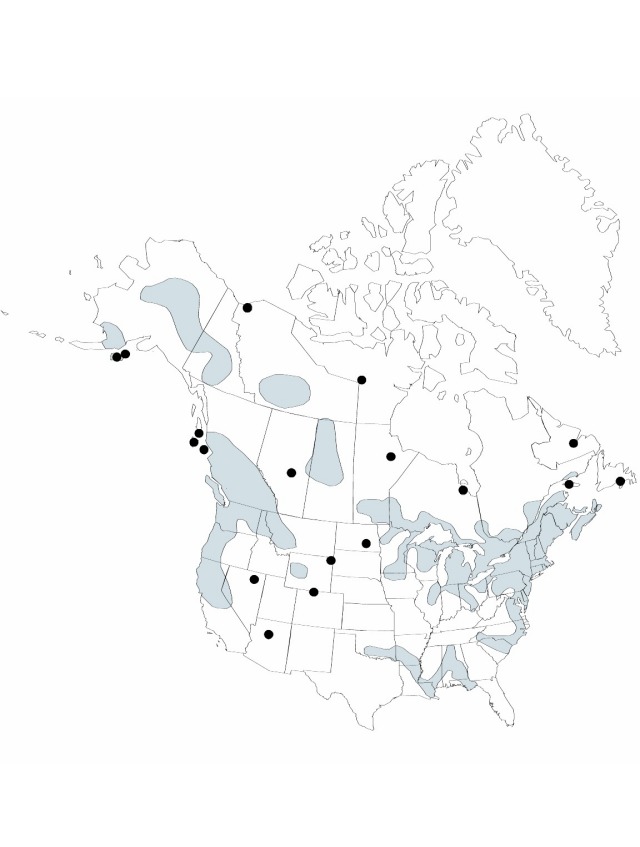Difference between revisions of "Potamogeton pusillus subsp. tenuissimus"
Novon 6: 370. 1996.
FNA>Volume Importer |
imported>Volume Importer |
||
| (6 intermediate revisions by 2 users not shown) | |||
| Line 8: | Line 8: | ||
}} | }} | ||
|common_names=Potamot très ténu | |common_names=Potamot très ténu | ||
| − | |basionyms={{Treatment/ID/ | + | |basionyms={{Treatment/ID/Basionym |
|name=Potamogeton pusillus var. tenuissimus | |name=Potamogeton pusillus var. tenuissimus | ||
|authority=Mertens & W. D. J. Koch | |authority=Mertens & W. D. J. Koch | ||
| + | |rank=variety | ||
| + | |publication_title=in J. C. Röhling, Deutschl. Fl. ed. | ||
| + | |publication_place=3, 1: 857. 1823 | ||
}} | }} | ||
|synonyms={{Treatment/ID/Synonym | |synonyms={{Treatment/ID/Synonym | ||
|name=Potamogeton berchtoldii | |name=Potamogeton berchtoldii | ||
|authority=Fieber | |authority=Fieber | ||
| − | }}{{Treatment/ID/Synonym | + | |rank=species |
| + | }} {{Treatment/ID/Synonym | ||
|name=Potamogeton berchtoldii var. colpophilus | |name=Potamogeton berchtoldii var. colpophilus | ||
|authority=(Fernald) Fernald | |authority=(Fernald) Fernald | ||
| − | }}{{Treatment/ID/Synonym | + | |rank=variety |
| + | }} {{Treatment/ID/Synonym | ||
|name=Potamogeton berchtoldii var. lacunatus | |name=Potamogeton berchtoldii var. lacunatus | ||
|authority=(Hagström) Fernald | |authority=(Hagström) Fernald | ||
| − | }}{{Treatment/ID/Synonym | + | |rank=variety |
| + | }} {{Treatment/ID/Synonym | ||
|name=Potamogeton berchtoldii var. polyphyllus | |name=Potamogeton berchtoldii var. polyphyllus | ||
|authority=(Morong) Fernald | |authority=(Morong) Fernald | ||
| − | }}{{Treatment/ID/Synonym | + | |rank=variety |
| + | }} {{Treatment/ID/Synonym | ||
|name=Potamogeton berchtoldii var. tenuissimus | |name=Potamogeton berchtoldii var. tenuissimus | ||
|authority=(Mertens & W. D. J. Koch) Fernald | |authority=(Mertens & W. D. J. Koch) Fernald | ||
| + | |rank=variety | ||
}} | }} | ||
|hierarchy=Potamogetonaceae;Potamogeton;Potamogeton pusillus;Potamogeton pusillus subsp. tenuissimus | |hierarchy=Potamogetonaceae;Potamogeton;Potamogeton pusillus;Potamogeton pusillus subsp. tenuissimus | ||
| Line 43: | Line 51: | ||
|distribution=Alta.;B.C.;Man.;N.B.;Nfld. and Labr.;N.W.T.;N.S.;Nunavut;Ont.;P.E.I.;Que.;Sask.;Yukon;Ala.;Alaska;Ariz.;Ark.;Calif.;Colo.;Conn.;Del.;D.C.;Fla.;Ga.;Idaho;Ill.;Ind.;Iowa;Ky.;La.;Maine;Md.;Mass.;Mich.;Minn.;Miss.;Mont.;Nev.;N.H.;N.J.;N.Y.;N.C.;N.Dak.;Ohio;Okla.;Oreg.;Pa.;R.I.;S.C.;Vt.;Va.;Wash.;Wis.;Wyo.;Eurasia. | |distribution=Alta.;B.C.;Man.;N.B.;Nfld. and Labr.;N.W.T.;N.S.;Nunavut;Ont.;P.E.I.;Que.;Sask.;Yukon;Ala.;Alaska;Ariz.;Ark.;Calif.;Colo.;Conn.;Del.;D.C.;Fla.;Ga.;Idaho;Ill.;Ind.;Iowa;Ky.;La.;Maine;Md.;Mass.;Mich.;Minn.;Miss.;Mont.;Nev.;N.H.;N.J.;N.Y.;N.C.;N.Dak.;Ohio;Okla.;Oreg.;Pa.;R.I.;S.C.;Vt.;Va.;Wash.;Wis.;Wyo.;Eurasia. | ||
|discussion=<p>Although Delaware and West Virginia lies within the mapped area, we know of no collections from that state.</p><!-- | |discussion=<p>Although Delaware and West Virginia lies within the mapped area, we know of no collections from that state.</p><!-- | ||
| − | --><p>Potamogeton pusillus subsp. tenuissimus is the most common linear-leaved subspecies of the family in temperate North America. Whenever one finds a linear-leaved pondweed with 1–5 rows of lacunae on each side of the midvein, chances are that it is subsp. tenuissimus.</p><!-- | + | --><p><i>Potamogeton pusillus </i>subsp.<i> tenuissimus</i> is the most common linear-leaved subspecies of the family in temperate North America. Whenever one finds a linear-leaved pondweed with 1–5 rows of lacunae on each side of the midvein, chances are that it is <i></i>subsp.<i> tenuissimus</i>.</p><!-- |
| − | --><p>Only Potamogeton obtusifolius could be confused with the taxon, and it can be separated by having its cylindric inflorescence, whereas subsp. tenuissimus has a capitate inflorescence.</p> | + | --><p>Only <i>Potamogeton obtusifolius</i> could be confused with the taxon, and it can be separated by having its cylindric inflorescence, whereas <i></i>subsp.<i> tenuissimus</i> has a capitate inflorescence.</p> |
|tables= | |tables= | ||
|references= | |references= | ||
| Line 53: | Line 61: | ||
-->{{#Taxon: | -->{{#Taxon: | ||
name=Potamogeton pusillus subsp. tenuissimus | name=Potamogeton pusillus subsp. tenuissimus | ||
| − | |||
|authority=(Mertens & W. D. J. Koch) R. R. Haynes & Hellquist | |authority=(Mertens & W. D. J. Koch) R. R. Haynes & Hellquist | ||
|rank=subspecies | |rank=subspecies | ||
| Line 68: | Line 75: | ||
|publication year=1996 | |publication year=1996 | ||
|special status= | |special status= | ||
| − | |source xml=https:// | + | |source xml=https://bitbucket.org/aafc-mbb/fna-data-curation/src/2e0870ddd59836b60bcf96646a41e87ea5a5943a/coarse_grained_fna_xml/V22/V22_485.xml |
|genus=Potamogeton | |genus=Potamogeton | ||
|species=Potamogeton pusillus | |species=Potamogeton pusillus | ||
Latest revision as of 20:31, 5 November 2020
Leaves: stipules convolute; blade 0.9–5.4 cm × 0.2–2.5 mm; apex acute to obtuse, lacunae in 1–5 rows each side of midrib; veins 1–3(–5). Inflorescences: peduncles more than 3 per plant, cylindric to slightly clavate; spikes capitate to cylindric, continuous. Fruits ovoid, sides rounded, rarely concave; beak median, rarely toward adaxial edge. 2n = 26.
Phenology: Flowering and fruiting summer–fall.
Habitat: Shallow waters of lakes and streams
Elevation: 0–2100 m
Distribution

Alta., B.C., Man., N.B., Nfld. and Labr., N.W.T., N.S., Nunavut, Ont., P.E.I., Que., Sask., Yukon, Ala., Alaska, Ariz., Ark., Calif., Colo., Conn., Del., D.C., Fla., Ga., Idaho, Ill., Ind., Iowa, Ky., La., Maine, Md., Mass., Mich., Minn., Miss., Mont., Nev., N.H., N.J., N.Y., N.C., N.Dak., Ohio, Okla., Oreg., Pa., R.I., S.C., Vt., Va., Wash., Wis., Wyo., Eurasia.
Discussion
Although Delaware and West Virginia lies within the mapped area, we know of no collections from that state.
Potamogeton pusillus subsp. tenuissimus is the most common linear-leaved subspecies of the family in temperate North America. Whenever one finds a linear-leaved pondweed with 1–5 rows of lacunae on each side of the midvein, chances are that it is subsp. tenuissimus.
Only Potamogeton obtusifolius could be confused with the taxon, and it can be separated by having its cylindric inflorescence, whereas subsp. tenuissimus has a capitate inflorescence.
Selected References
None.